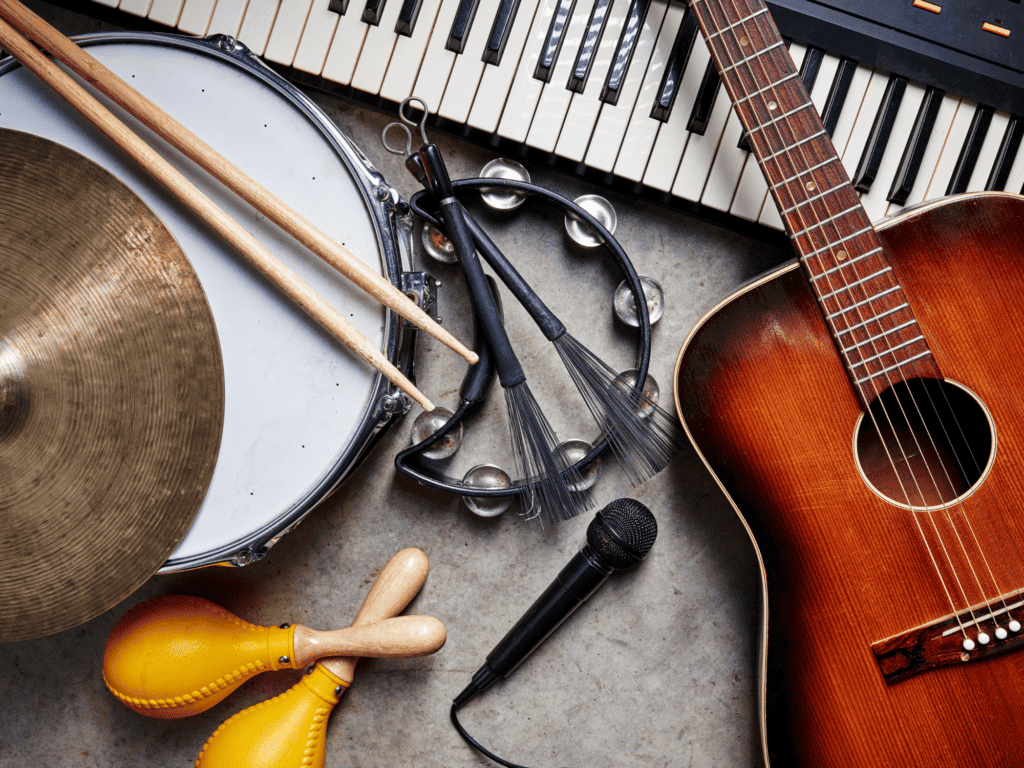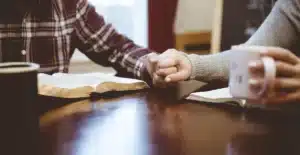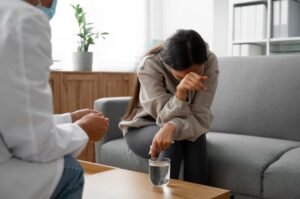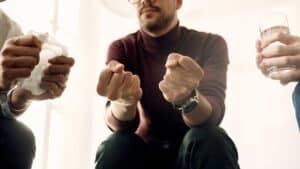Music has always been a huge part of my life. It’s a universal language that allows us all to communicate with each other, and express ourselves in the rawest, purest form. There’s a connection between the performer and listener, expressing thoughts and feelings in a way that words never could. I can remember the intense feelings music produced in me ever since I was a young child, and I picked up the drums at an early age to express myself, and see if I had what it takes to live up to some of my boyhood heroes.
Like a lot of other guys my age, I was a huge Led Zeppelin fan. They had a major influence on my life, and the direction I would go in as a musician and a performer. I’ve always dreamed of playing a show with Robert Plant (Led Zeppelin’s frontman), or just having the chance to meet him and talk music. I continued to perform, and after playing with a few other bands and side projects, I had the opportunity to join the Sonics. Throughout that time I had done some drinking and a little experimenting with drugs, but that’s when the addiction really started to take hold. The band continued, but so did the drugs, and my life started to take a turn for the worse. After what seemed like an eternity of drinking, hangovers, and morning spent hating myself and the decisions I’d made, I managed to get sober. I’ve stayed that way for 24 years, and it’s hands down the best thing to ever happen to me. My music career took off, and I’ve been able to perform in the most amazing places with the most talented people. I was given the opportunity to work in the recovery field, and help other addicts and alcoholics like myself to sober up and change their lives. And I finally got the opportunity to have a nice, long conversation with one of my biggest influences and a man I greatly respect: Robert Plant.
Robert plant and 16,000 screaming fans in Toronto. Now that really got my heart beating. Robert contacted our manager after seeing us perform in London, and invited us to come out on the road with him. Of course I accepted. Fast forward to soundcheck, setting up the Ludwig drumset they provided, and me trying to look casual as I scan the room to see if I could make out Robert walking around. No sign of him anywhere. I grab a bite to eat at catering, where I overhear that he and his band decided to skip out on soundcheck and take a tour of Niagara Falls. Better luck next time, Dusty.
We take the stage, and the show goes great. As I’m playing I start panning the crowd, and I make eye contact with Robert, who’s watching the show on the left side of the stage with his bandmates, agent, and the rest of the entourage. We finish strong, and I make my way over to Robert and his people.
As soon as I introduce myself he started talking rapidly, telling me how much he loved our performance. We were like the Beatles! I was blown away; we were nowhere near the Beatles, they were magical. What he was referring to was our delivery, and that our energy was that of a rapidfire American rock and roll band. I found out later that the Sonics had actually inspired him, which is something I never knew. While he was still excited from the performance, he jabs his finger right in my sternum and says “you play with so much energy- you NEED to be on a drum riser!” The very next night I was playing on a drum riser, and kept it for the rest of the tour.
I excuse myself to my dressing room to cleanup up and change, and it wasn’t long before Robert joined me. We spend the next 20 minutes hanging around, chatting about music. No security, no handlers; just me and Robert Plant.
The tour really kicked off after that night. We actually had to turn down one of the shows because of a scheduling conflict, but we were able to headline the Montreal Pop Festival by ourselves. That is amazing because it means we get to share the stage with Robert. The energy is electric, and it was one of the highlights of my career. After the performance, we get on a plane to New York, and because we arrived a day early I’m able to take the night off. I use it to see the Eagles of Death metal, who take great care of us and admit to being fans of the Sonics. I have a great time hanging out with the guys from that scene, and love the Queens of the Stone Age.
It’s the next day, and I realize it’s been a week since I’ve been able to hit a meeting. Unfortunately I’m used to it by now- it isn’t uncommon for my schedule on tour to be so tight that I’m not able to make it to a meeting. There usually aren’t many people in recovery on a tour, and this time I was the only one in the program. I’ve gotten used to that too, but it’s always comforting to be around someone else in the program- someone who knows that it’s like to be away from meetings and the homegroup. Because of situations like these, I always travel with my daily reflections and my big book, and keep an arsenal of speaker tapes loaded onto my phone. So I plug in my headphones, turn on one of my favorite talks, and get out my Daily Reflections. Even if it’s something as simple as reading a few pages of my Big Book and doing some prayer and meditation, I make sure to take a moment every day to work on my program.
I get the chance to catch up with Robert again before our show in New York. He and his drummer are soundchecking before the show, and he starts telling me about his drummer, and how he plays jazz-style improvisations in all sorts of time signatures. I looked him right in the eye and tell him he should play more like the Sonics. We both have a good laugh. He moves onto telling me about his affection for African music. There’s something about it; the hand drums, the indigenous instruments- they captivate him. You can see their influence on him in his music, and how they’re made their way into Led Zeppelin songs like “Black Dog” and “Whole Lotta Love.” I’ve heard those songs a million times, and recognized the African-style interludes, but I never realized the extent and depth of his interest. Our conversation shifts into his experience with his band, his life, and some of his other musical influences. He told me about his humble beginnings as jazz drummer from eastside London, and some of his recent travels in Africa.
The following night’s discussion centers around reinventing yourself as a performer and an individual, and how he has done so many times in his career. His first bout with success was as the frontman of one of the greatest rock bands of all time. But even after the band broke up, his passion for music remained. He needed to continue performing, but decided to alter his image to something a little more conducive with his new project as a pop solo artist. It wasn’t long before he reinvented himself again, hooking up with bluegrass star Alison Krauss to write a duet album and launch a tour. That decision brought him to Nashville, TN, and won him 6 Grammys that year alone.
Throughout all of our conversations, it kept dawning on me what a down-to-earth, normal guy Robert is. Sure, he’s talking about being in Led Zeppelin and winning six Grammys in a year, but it was the way he talked about it that matters. He’s just another guy talking about his love of music, and the joy it gives him to perform for a crowd and share his music with others. In this moment, I’m not talking to Robert Plant the legend, I’m just talking to a regular guy who loves music.
Our next show is at the Hammerstein Ballroom, a smaller venue with only 6,500 audience members in a sold out show. Seeing how much fun Robert is having on stage really brings a smile to my face. I can see him laughing in between songs, and stomping his feet and jumping into their air while playing his tambourine. Watching Robert and the pleasure he gets out of performing is an absolute joy.
The next day in Boston, I tell him what I saw, and that the amount of fun he was having was evident in his performance. He just looks at me and smiles.
Our last night on tour was an outdoor venue, and something about the atmosphere made be instantly comfortable. The initial excitement of the tour was still there, but it had evolved into an “ok, we’re here to rock” feeling. The band was completely in sync with each other. After the show, Robert comes into our dressing room and hangs out with us for a long time. We talk more about music, and he expresses his gratitude that we were able to come on tour with him again. He asks us to do it again, and we have tentative plans for another tour sometime in 2016. I can’t even begin to tell you how excited I am for that one.
Things haven’t really changed for me since the third year of my sobriety, and I mean that in a good way. That’s when I came out of the fog and realized the importance of my sobriety, and exactly what it really meant to “be sober.” It took me those first three years to understand that sobriety was a whole lot more than abstinence- it was about service and honesty. It was a lifestyle. By my fifth year in recovery, I was consistently doing what I needed to keep my sobriety, and had the tools necessary to feel stable and confident in my recovery for the first time.
Sobriety has given me so many things. I get to take an active role in my life today, and I feel comfortable in new situations and meeting new people. I have confidence, and the ability to pause and just enjoy the moment. I am responsible, and my coworkers and friends know that they can count on me to do my part. I can carry some of the guys bags without copping an attitude. The hotel lobby can call early in the morning, and I can listen to my agenda with a clear head and the knowledge that I can handle whatever responsibilities I have that day.
I fly home on a Monday night, and wake up the next morning at 5:30am for work. I meet my music group in the studio the next day, and am greeted with excitement, and enthusiastic requests to see the pictures from my tour. I get to share my amazing experience with Robert and the tour, and more importantly, my experience as a person with 25 years sober who is really getting the most out of his life. I love the clients in our music program, and the way that the program really captures the transformative experience of making music, and gives them the opportunity to create something in a therapeutic environment. I feel like they’re really getting something out of the time we spend together, and it’s satisfying to know that our music program is really adding something to the lives of all of these people in early recovery.
I’ve hear the expression “Once an addict- always an addict,” and I think it’s a fallacy. I understand what they mean, and that my sobriety is a tenuous thing that needs to be maintained, but the person I’ve become today is completely unrecognizable from the addict that I was. The experiences I’ve had in sobriety have been incredible. I’m involved in a music program that brings healing and hope to hundreds of recovering addicts and alcoholics. I get to play music professionally, and go on tours like the one I just finished. And the quality of life I have today is priceless, and brings me a sense of happiness and peace that I can’t even begin to describe.
I will always identify as an addict, but I am no longer the person that I was 25 years ago.
Author
-

President, CEO & Founder at Northbound Treatment Network
Paul Alexander is the CEO, President & Founder of Northbound Treatment Network in Newport Beach, California. He believes wholeheartedly in transformational leadership, organizational health and effective, fully integrated substance use disorder and mental health treatment. With over 27 years of experience in behavioral healthcare, Paul has extensive knowledge of “in vivo” treatment modalities, clinical development, operations, strategy, marketing and financial planning. He has been widely recognized for his development of collegiate-based residential treatment programs for students in recovery and authored a research study at The University of California confirming this modality’s effectiveness.
Paul’s comprehensive professional experience, willingness to innovate, and emphasis on organizational health are vital factors in Northbound’s continued success. Paul received his Certified Addiction Treatment Specialist training at Saddleback College in Mission Viejo, CA, and was awarded Outstanding Alumni Service Award in 2002. Paul holds a Bachelor of Arts degree in Criminology, Law and Society, Summa Cum Laude, from University of California, Irvine, and a Juris Doctorate degree from Loyola Law School of Los Angeles. Paul currently serves on The National Association of Addiction Treatment Providers (NAATP) board. In addition, he serves on The Family Recovery Foundation board and The CarePossible board in Orange County; both organizations are committed to raising funds for family recovery and treatment for former military personnel. Paul is in recovery himself and lives in Orange County with his wife Silvana and his two young sons, Noah and Dean.







